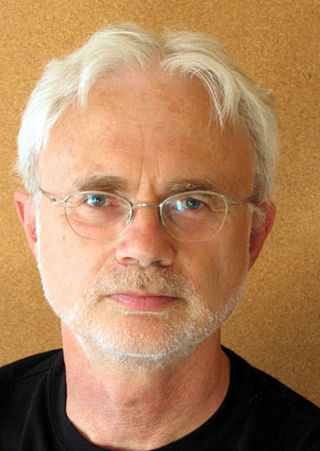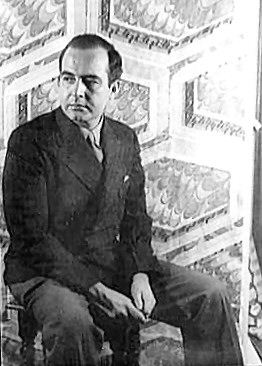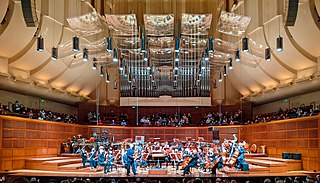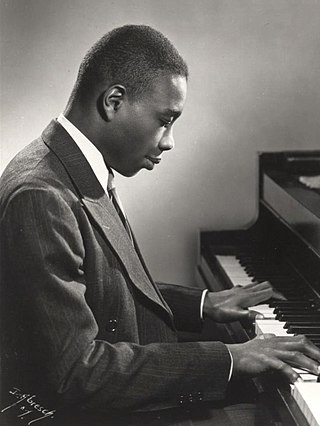Ice Field is a musical composition by Henry Brant, for large orchestral groups and organ, commissioned by Other Minds for a December 2001 premiere by the San Francisco Symphony. [1] It was awarded the 2002 Pulitzer Prize for Music, [2] [3] and premiered on December 12 at Davies Symphony Hall in San Francisco. [4] A, "'spatial narrative,'" [4] or, "spatial organ concerto," [5] and thus an example of Brant's use of spatialization, the work utilizes more than 100 players. [6]
It was the strong feeling of the Jury that the Brant score was an extraordinarily powerful statement, the culmination of a life's work. His control of diverse instrumental groups in a spatial environment coalesces into powerful and coherent musical expression. Here, Brant, in his ninth decade, has refined his techniques of spatial music, embracing all of his experience to produce a remarkable vision, with increased vitality and creative imagination.
—
The Pulitzer Prize Board [7]
The piece was, "inspired by his experience, as a 12-year-old in 1926, of crossing the Atlantic by ship, which navigated carefully through a large field of icebergs in the North Atlantic." [8]

John Coolidge Adams is an American composer and conductor. Among the most regularly performed composers of contemporary classical music, he is particularly noted for his operas, many of which center around historical events. Apart from opera, his oeuvre includes orchestral, concertante, vocal, choral, chamber, electroacoustic, and piano music.

Samuel Osmond Barber II was an American composer, pianist, conductor, baritone, and music educator, and one of the most celebrated composers of the mid-20th century. Principally influenced by nine years' composition studies with Rosario Scalero at the Curtis Institute and more than 25 years' study with his uncle, the composer Sidney Homer, Barber's music usually eschewed the experimental trends of musical modernism in favor of traditional 19th-century harmonic language and formal structure embracing lyricism and emotional expression. However, he adopted elements of modernism after 1940 in some of his compositions, such as an increased use of dissonance and chromaticism in the Cello Concerto (1945) and Medea's Dance of Vengeance (1955); and the use of tonal ambiguity and a narrow use of serialism in his Piano Sonata (1949), Prayers of Kierkegaard (1954), and Nocturne (1959).

The Pulitzer Prize for Music is one of seven Pulitzer Prizes awarded annually in Letters, Drama, and Music. It was first given in 1943. Joseph Pulitzer arranged for a music scholarship to be awarded each year, and this was eventually converted into a prize: "For a distinguished musical composition of significant dimension by an American that has had its first performance in the United States during the year."

The San Francisco Symphony, founded in 1911, is an American orchestra based in San Francisco, California. Since 1980 the orchestra has been resident at the Louise M. Davies Symphony Hall in the city's Hayes Valley neighborhood. The San Francisco Symphony Youth Orchestra and the San Francisco Symphony Chorus (1972) are part of the organization. Michael Tilson Thomas became the orchestra's music director in 1995, and concluded his tenure in 2020 when Esa-Pekka Salonen took over the position.

Lou Silver Harrison was an American composer, music critic, music theorist, painter, and creator of unique musical instruments. Harrison initially wrote in a dissonant, ultramodernist style similar to his former teacher and contemporary, Henry Cowell, but later moved toward incorporating elements of non-Western cultures into his work. Notable examples include a number of pieces written for Javanese style gamelan instruments, inspired after studying with noted gamelan musician Kanjeng Notoprojo in Indonesia. Harrison would create his own musical ensembles and instruments with his partner, William Colvig, who are now both considered founders of the American gamelan movement and world music; along with composers Harry Partch and Claude Vivier, and ethnomusicologist Colin McPhee.

Henry Dreyfuss Brant was a Canadian-born American composer. An expert orchestrator with a flair for experimentation, many of Brant's works featured spatialization techniques.

Marvin Frederick Hamlisch was an American composer and conductor. He is one of a handful of people to win Emmy, Grammy, Oscar and Tony awards, a feat dubbed the "EGOT". He and composer Richard Rodgers are the only people to have won those prizes and a Pulitzer Prize ("PEGOT").

William Elden Bolcom is an American composer and pianist. He has received the Pulitzer Prize, the National Medal of Arts, a Grammy Award, the Detroit Music Award and was named 2007 Composer of the Year by Musical America. He taught composition at the University of Michigan from 1973 until 2008. He is married to mezzo-soprano Joan Morris.

Roger Lee Reynolds is an American composer. He is known for his capacity to integrate diverse ideas and resources, and for the seamless blending of traditional musical sounds with those newly enabled by technology. Beyond composition, his contributions to musical life include mentorship, algorithmic design, engagement with psychoacoustics, writing books and articles, and festival organization.

Gunther Alexander Schuller was an American composer, conductor, horn player, author, historian, educator, publisher, and jazz musician.

Roger Huntington Sessions was an American composer, teacher, and writer on music. He had initially started his career writing in a neoclassical style, but gradually moved further towards more complex harmonies and postromanticism, and finally the twelve-tone serialism of the Second Viennese School. Sessions' friendship with Arnold Schoenberg influenced this, but he would modify the technique to develop a unique style involving rows to supply melodic thematic material, while composing the subsidiary parts in a free and dissonant manner.
A listing of the Pulitzer Prize award winners for 2002:

George Theophilus Walker was an American composer, pianist, and organist, and the first African American to win the Pulitzer Prize for Music, which he received for his work Lilacs in 1996. Walker was married to pianist and scholar Helen Walker-Hill between 1960 and 1975. Walker was the father of two sons, violinist and composer Gregory T.S. Walker and playwright Ian Walker.
Aaron Jay Kernis is a Pulitzer Prize- and Grammy Award-winning American composer serving as a member of the Yale School of Music faculty. Kernis spent 15 years as the music advisor to the Minnesota Orchestra and as director of the Minnesota Orchestra's Composers' Institute, and is currently the workshop director of the Nashville Symphony Composer Lab. He has received numerous awards and honors throughout his thirty-five-year career. He lives in New York City with his wife, pianist Evelyne Luest, and their two children.

Other Minds is an American nonprofit organization based in San Francisco. It was founded In 1992 by Charles Amirkhanian and Jim Newman. According to their mission statement, the organization is dedicated to the "encouragement and propagation of contemporary music."
Bright Sheng is a Chinese-born American composer, pianist and conductor. Sheng has earned many honors for his music and compositions, including a MacArthur Fellowship in 2001; he also was a two-time Pulitzer Prize finalist. His music has been commissioned and performed by virtually every major American symphony orchestra, in addition to the Orchestre de Paris, Royal Concertgebouw Orchestra, Toronto Symphony Orchestra, BBC Symphony Orchestra, London Sinfonietta, St. Petersburg Philharmonic Orchestra, Russian National Orchestra, Finnish Radio Symphony Orchestra, Sydney Symphony Orchestra, National Symphony Orchestra of Taiwan, Shanghai Philharmonic Orchestra, Tokyo Philharmonic Orchestra, and the Seoul Philharmonic Orchestra among numerous others. His music has been performed by such musicians as the conductors Leonard Bernstein, Kurt Masur, Christoph Eschenbach, Charles Dutoit, Michael Tilson Thomas, Leonard Slatkin, Gerard Schwarz, David Robertson, David Zinman, Neeme Järvi, Robert Spano, Hugh Wolff; the cellists Yo-Yo Ma, Lynn Harrell, and Alisa Weilerstein; the pianists Emanuel Ax, Yefim Bronfman, and Peter Serkin; the violinists Gil Shaham and Cho-Liang Lin; and the percussionist Evelyn Glennie.

Tod Machover, is a composer and an innovator in the application of technology in music. He is the son of Wilma Machover, a pianist and Carl Machover, a computer scientist.
Michael Charles Colgrass was an American and Canadian musician, composer, and educator. He was an associate composer of the Canadian Music Centre.
Mason Wesley Bates is a Grammy award-winning American composer of symphonic music and DJ of electronic dance music. He is the first composer-in-residence of the Kennedy Center for the Performing Arts, and he has also been in residence with Chicago Symphony Orchestra, the San Francisco Symphony, the Pittsburgh Symphony, and the California Symphony. In addition to his notable works Mothership, Anthology of Fantastic Zoology, and The (R)evolution of Steve Jobs, he composed the score to Gus Van Sant's film The Sea of Trees. In a 2018 survey of American orchestras, he was rated the second-most performed living composer.
Spatial music is composed music that intentionally exploits sound localization. Though present in Western music from biblical times in the form of the antiphon, as a component specific to new musical techniques the concept of spatial music was introduced as early as 1928 in Germany.













